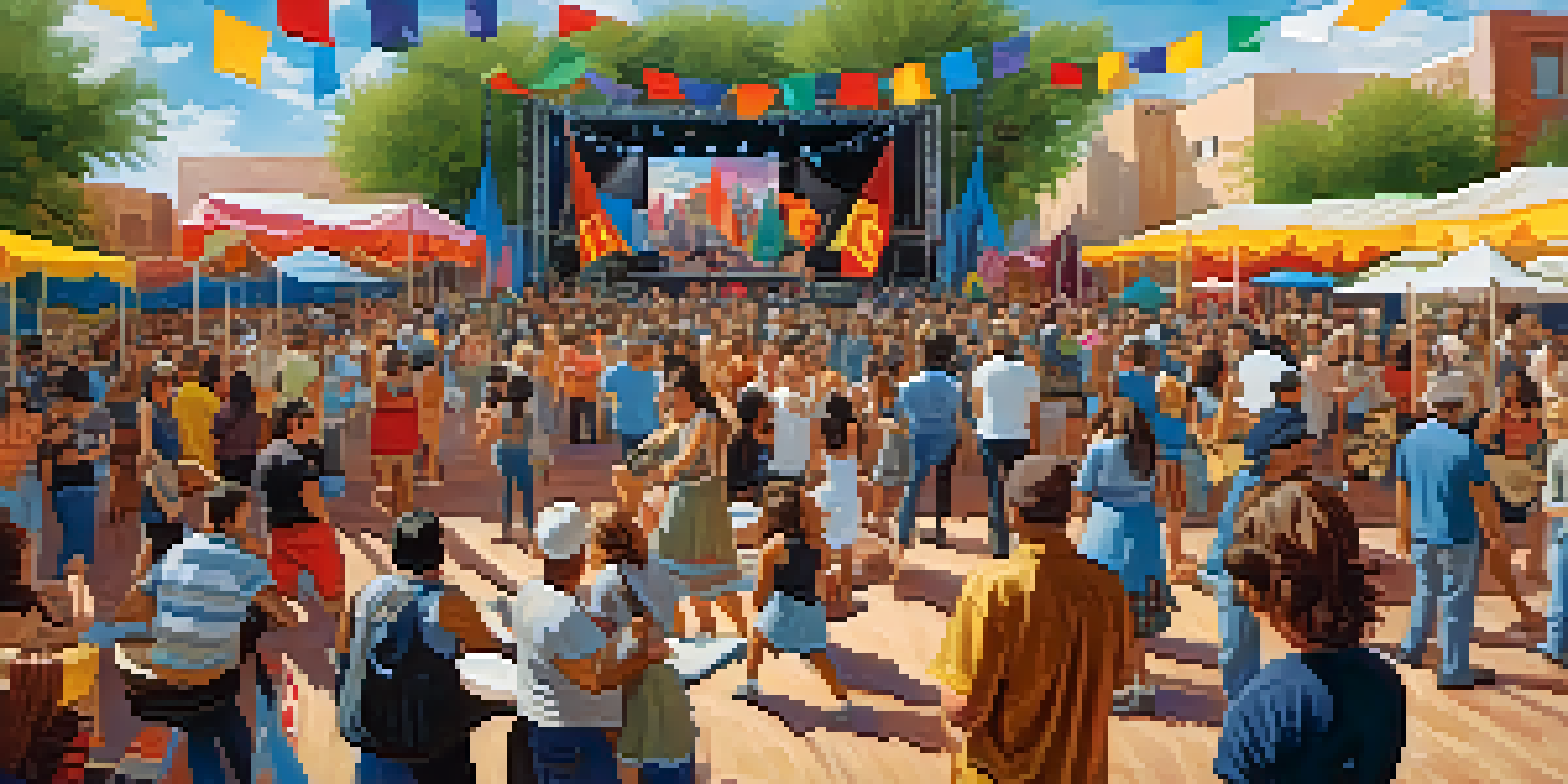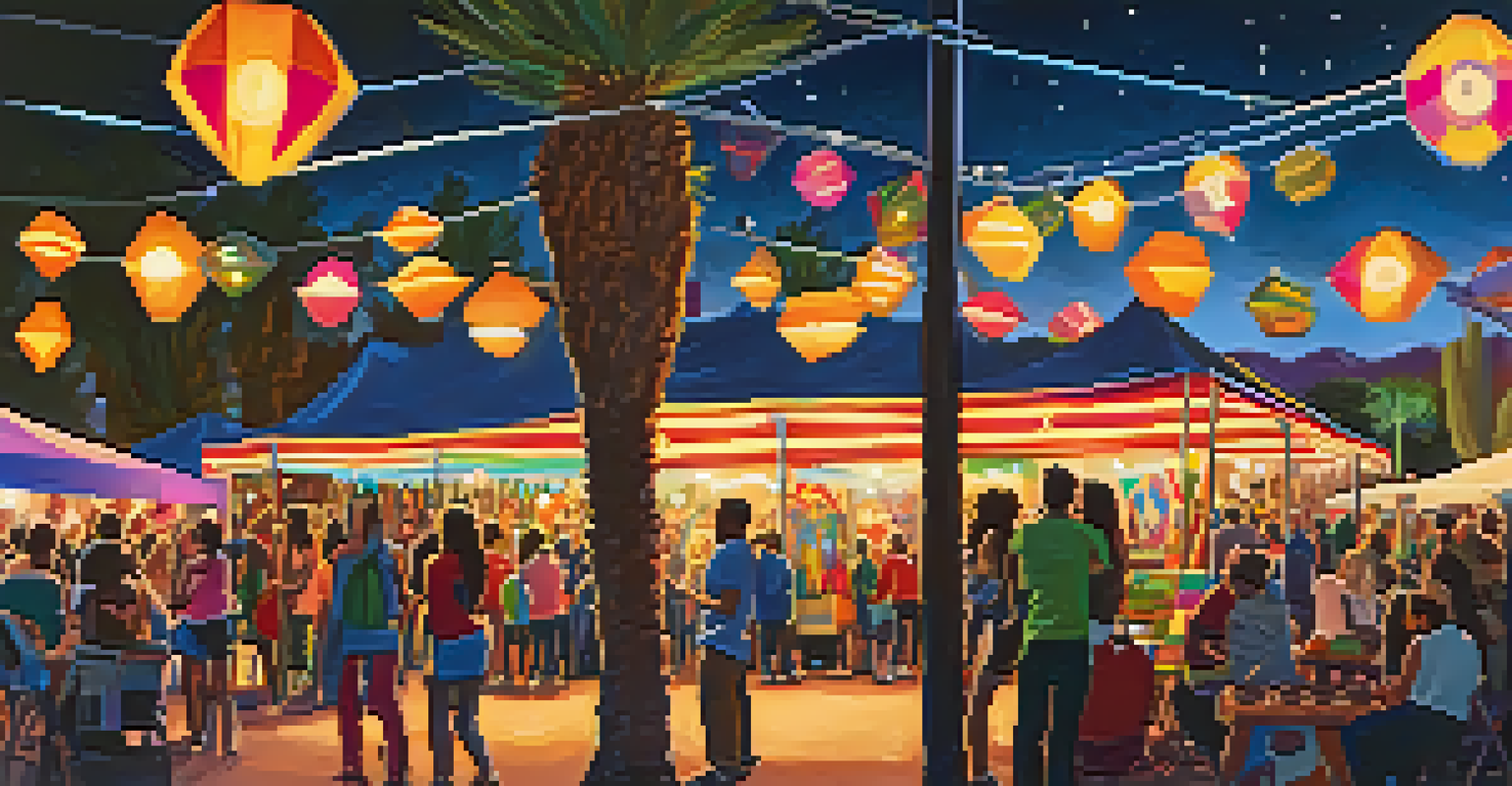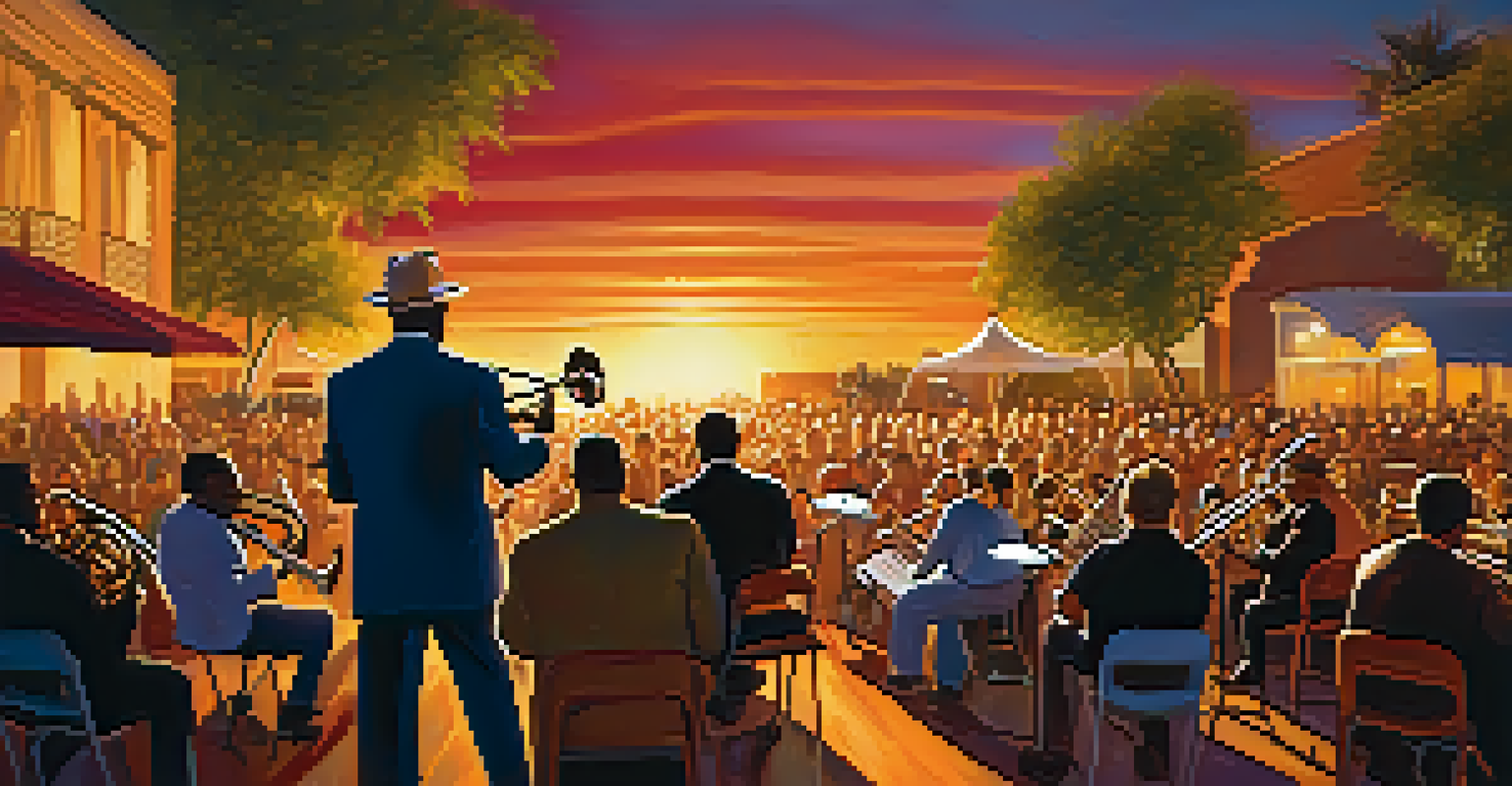Iconic Music Festivals That Shaped Tucson's Local Scene

The Birth of Tucson's Music Festival Scene
Tucson's music festival scene began to take shape in the late 20th century, driven by a mix of local talent and a burgeoning appreciation for diverse genres. Events were often grassroots efforts, reflecting the city's unique cultural tapestry. This laid the groundwork for larger festivals that would soon follow, drawing attention from beyond the city limits.
Music is the universal language of mankind.
One of the earliest festivals was the Tucson Folk Festival, which started in 1985. It celebrated local musicians and attracted folk artists from around the country, providing a platform for emerging talents. This festival not only showcased music but also fostered a sense of community and collaboration among artists.
As the local scene grew, so did the ambition and scale of the festivals. Artists, fans, and organizers began to see Tucson as a hub for musical creativity, paving the way for the iconic events that would shape the region's cultural landscape.
Tucson Folk Festival: A Celebration of Roots
The Tucson Folk Festival has become a staple in the city's cultural calendar, celebrating its roots in folk music while embracing a variety of genres. Held annually in May, the festival features performances from both local and national artists, creating an inclusive atmosphere for music lovers. It's a space where storytelling through song takes center stage, captivating audiences year after year.

Not only does the festival showcase established acts, but it also nurtures up-and-coming musicians. Workshops and open mic sessions allow aspiring artists to share their talents, fostering a supportive community. This emphasis on mentorship and collaboration is a hallmark of the festival, encouraging creativity and connection.
Tucson's Festivals Celebrate Diversity
The city's music festivals showcase a rich variety of genres and cultural influences, reflecting Tucson's vibrant artistic landscape.
With its free admission policy, the Tucson Folk Festival makes music accessible to everyone, drawing crowds from all walks of life. This inclusivity has helped solidify its status as a beloved event that continues to reflect the spirit of Tucson.
Gem & Jam Festival: Art Meets Music
The Gem & Jam Festival, which began in 2004, is a vibrant mix of music, art, and community, held during the Tucson Gem and Mineral Show. What sets this festival apart is its unique blend of genres, featuring everything from electronic to jam bands. This eclectic lineup attracts a diverse audience, creating an energetic and festive atmosphere.
Where words fail, music speaks.
In addition to musical performances, the festival highlights the artistic side of Tucson. Local artists display their work, and interactive art installations invite attendees to engage with creativity in new ways. This fusion of music and art transforms the festival into a multi-sensory experience that celebrates the city's rich artistic heritage.
The Gem & Jam Festival has grown significantly over the years, embracing the evolution of music and art in Tucson. It has not only become a landmark event but also a reflection of the city’s dynamic cultural landscape.
Tucson Mariachi Conference: A Cultural Icon
The Tucson Mariachi Conference, established in 1982, highlights the importance of mariachi music in the cultural fabric of Tucson. This festival brings together talented musicians from across the country to celebrate and promote this traditional art form. Through workshops and performances, it fosters a deeper appreciation for mariachi music's rich history and cultural significance.
What makes the conference special is its commitment to education. It offers master classes for musicians of all ages, ensuring that the art of mariachi continues to thrive. This focus on teaching helps to inspire the next generation of musicians and keeps the tradition alive in the community.
Community and Economic Impact
Music festivals in Tucson not only foster community spirit and collaboration but also boost the local economy by attracting visitors.
The Tucson Mariachi Conference is more than just a music festival; it’s a celebration of heritage, unity, and cultural pride. It serves as a reminder of the diverse influences that shape Tucson's vibrant music scene.
Tucson Jazz Festival: A Melodic Journey
The Tucson Jazz Festival has become a beacon for jazz enthusiasts since its inception in 2015. This annual event showcases a diverse lineup of legendary jazz musicians alongside emerging artists. The festival's commitment to celebrating both the past and present of jazz allows attendees to experience a rich tapestry of sounds and styles.
In addition to concerts, the festival hosts educational events, masterclasses, and jam sessions. These activities provide opportunities for local musicians to learn from their idols and connect with fellow jazz lovers. Such interactions help to cultivate a vibrant jazz community in Tucson.
With its growing popularity, the Tucson Jazz Festival has positioned itself as a significant cultural event in the region. It draws not only local fans but also visitors from around the country, eager to experience Tucson's unique take on jazz.
Tucson Blues Festival: A Celebration of the Blues
The Tucson Blues Festival, which began in 1996, celebrates the rich history of blues music while offering a platform for both local and national artists. This festival has become a highlight on the Tucson music calendar, drawing blues aficionados eager to enjoy live performances. The festival emphasizes the genre’s roots and its evolution, showcasing a range of styles from traditional to contemporary blues.
Beyond the music, the Tucson Blues Festival promotes community engagement through workshops and interactive sessions. These activities provide insight into the blues genre, allowing participants to connect with the music on a deeper level. This educational aspect enhances the festival experience, making it accessible to blues novices and seasoned fans alike.
Support for Emerging Artists
Events like the Tucson Folk Festival and Tucson Music Festival prioritize local talent, providing platforms for aspiring musicians to thrive.
With its vibrant atmosphere and passionate performers, the Tucson Blues Festival has solidified its place in the city’s cultural landscape. It not only entertains but also educates and inspires, ensuring the legacy of the blues continues in Tucson.
Tucson Music Festival: Celebrating Diversity
The Tucson Music Festival is a melting pot of genres, showcasing the city's diverse musical landscape. This festival, which brings together artists from various backgrounds and styles, has become a celebration of Tucson's rich cultural heritage. From rock to hip-hop, the festival invites an array of performers, reflecting the city's eclectic sound.
One of the festival's key missions is to promote local talent. By providing a stage for emerging artists, it helps to cultivate the next generation of musicians. This commitment to local talent fosters a sense of pride and unity within the community, as attendees support homegrown artists.

As the Tucson Music Festival continues to grow, it reinforces the city's reputation as a hub for musical innovation. Its celebration of diversity echoes Tucson's identity, making it a cherished event for many.
The Impact of Music Festivals on Tucson's Scene
Music festivals in Tucson have played a pivotal role in shaping the local scene, fostering community and collaboration among artists. These events not only provide entertainment but also serve as a platform for cultural exchange. By bringing together diverse musical influences, they create a unique tapestry that reflects the spirit of Tucson.
Beyond just music, these festivals have economic benefits as well. They attract visitors from outside the region, boosting local businesses and contributing to the city’s economy. Restaurants, hotels, and shops often see a surge in customers during festival season, highlighting the events’ importance to Tucson's overall vitality.
In addition to economic impact, music festivals promote social connections and community pride. They create shared experiences that bring people together, fostering relationships and a sense of belonging. Through music, these festivals help weave the social fabric of Tucson, enhancing its cultural richness.